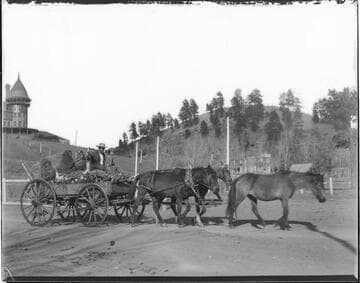Rare Books
Scenes from the land of sunshine : Souvenir of Las Vegas, Hot Springs, New Mexico
Image not available
You might also be interested in

Las Vegas Hot Springs
Visual Materials
Photo of horses pulling a cart carrying a family and a load of wood and hay.
photCL 449 (110)
Image not available
Las Vegas, Hot Springs
Visual Materials
A collection of glass plate and film negatives by amateur photographer and Los Angeles real estate broker George P. Thresher focusing on the American Southwest and Native Americans of the region, particularly of Arizona, and the Gila River crossing area, from ca. 1898 to 1910. The majority of the Thresher Collection contains images of towns and sites in Arizona, including Phoenix, Mission San Xavier del Bac, Montezuma Castle, Peach Springs, and adobe ruins. Photographs of Texas are well represented in the collection, including many views of Missions San Concepcion, San Antonio de Valero (the Alamo), San Francisco de la Espada, and Mission San Jose y San Miguel de Aguayo. There are also images of Colorado (Garden of the Gods, Pike's Peak, and Castle Rock), New Mexico (Santa Fe, Tesuque, and possibly Laguna), and unidentified pueblos. Notable portraits from California are of Victoriano, chief of the Soboba Indians, and his unnamed third wife. There is a separate and very interesting sequence of images depicting the Mount Beauty Mine and its operations in San Diego County, California. A small assortment of lantern slides is at the end of the collection showing Indians of Arizona, California, and New Mexico.
photCL 449

Las Vegas Hot Springs, 1882
Visual Materials
The Las Vegas Hot Springs and surroundings near Las Vegas, New Mexico.
photCL 215 (81)
Image not available
Las Vegas Hot Springs : [New Mexico, on the line of the Atchison, Topeka & Santa Fe railroad]
Rare Books
254349
Image not available
Old hotel at Las Vegas Hot Springs--deserted in October 1922
Visual Materials
This collection contains photographs of Elizabeth Compton Hegemann's travels through the Navajo Indian Reservation and the Grand Canyon from 1922 to 1934. It also documents Southwest Indian life and archaeological monuments during Hegemann's career based at the Shonto Trading Post. The most notable images depict Hegemann; United States National Park Service rangers; Fred Harvey Trading Company sites and employees; Navajo and Hopi Indians; trading posts; Charles F. Lummis; the Grand Canyon; various ruins of Indian pueblos; Hopi ceremonies; Navajo horse races; and natural rock formations scattered throughout Arizona
NM 2